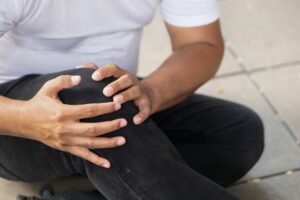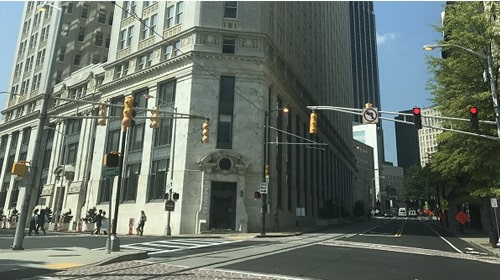Atlanta Slip & Fall Lawyers
If you’ve been injured in a slip and fall accident on property owned by another person or by a business in Georgia, you may be entitled to full financial compensation for the physical injuries and emotional pain you may have suffered.

An Slip and falls Lawyer in Atlanta can review the details of the incident, gather evidence, question witnesses, protect your rights, and if necessary, advocate aggressively for justice after a serious slip and fall injury.
What Can Cause Slip and Fall Accidents?
If you own a business, you are legally obligated to take measures that reduce the chances of slip and fall injuries on your property. Anyone with property open to the public should ensure that carpets and rugs are flat against the floor, that sidewalks and pavements are even and unobstructed, and that spills, water, ice, and snow are cleaned up right away. If you’re injured in a slip and fall incident on another person’s property anywhere in Georgia, obtain the legal advice you need and speak at once with an experienced Atlanta slip and fall attorney at Spaulding Injury Law: Atlanta Personal Injury & Car Accident Lawyer. Slip and fall accidents can be caused by all types of hazardous property conditions, such as:
- Wet or freshly waxed floors
- Rain or snow, especially when it accumulates in walkways and doorways
- An object or clutter obstructing an aisle or walkway
- Curled or improperly-placed floor mats or doormats
- Damaged, aging, or uneven stairs, especially wooden stairs
- Large cracks or craters in the pavement
- Unlit or poorly lit walkways and parking areas
When a property owner has been negligent regarding his or her property’s maintenance and repairs, and someone is consequently injured, the injury victim may have grounds to pursue a premises liability claim. When a property owner knew – or reasonably should have known – about a hazardous condition, and the owner failed to alleviate or repair the condition or alert visitors to the danger, a slip and fall injury victim may recover compensation for a variety of damages: current and future medical bills, lost wages and earnings capacity, pain and suffering, emotional trauma, and all other injury-related damages and costs.
Researchers at the Johns Hopkins University School of Medicine examined the records of more than 43,000 adults treated for spinal cord injuries in U.S. emergency rooms from 2007 through 2009. Falls were the leading cause of traumatic spinal cord injuries – responsible for 41.5 percent – over the three-year period. Slip and fall accidents also often result in back, neck, and head injuries, brain injuries, and multiple broken bones. As you might imagine, the elderly are the group at the greatest risk for slip and fall injuries.
Slip and Fall Accidents: The Statistics
The National Safety Council reports that injuries caused by falls led to more than 6.7 million emergency room visits in a recent year, and one million of these were slip and fall accidents. The Centers for Disease Control and Prevention (CDC) shares the following statistics of its own:
- One out of every five slip-and-fall accidents leads to a serious injury like a traumatic head injury (TBI) or a broken bone.
- Each year, more than 800,000 people are hospitalized as a result of falls, and the most common culprits are broken hips and TBIs.
- Falls account for more than 95 percent of broken hips.
- In a recent year, the overall medical expense related to falls came to more than $50 billion.
Slip and fall accidents are far more dangerous than many people realize. They are also highly common accidents, and they can happen to you at any time.
Losses from Slip and Falls Around Atlanta
Slipping and falling is not only exceptionally common but is also exceptionally dangerous. The categories of loss that victims of slip and fall accidents often experience include:
- Medical expenses that may need to address ongoing healthcare needs related to the slip and fall accident
- Lost income can be even more challenging if your future earning potential takes a hit
- Physical and emotional pain and suffering that can have many overarching consequences on your life
Reaching your fullest recovery is likely to hinge on your ability to successfully address every category of loss you experience in its entirety, and an experienced Atlanta slip and fall lawyer can help you with that.
The Elements of Your Atlanta Slip and Fall Accident Claim
Slip and fall accident claims can be especially challenging, and a better understanding of the basics can help you better protect your rights throughout the claim process. Four primary elements must be present to bring a successful slip and fall claim. Seek legal counsel from Spaulding Injury Law: Atlanta Personal Injury & Car Accident Lawyer.
DUTY OF CARE OWED
The property owner must have owed you a duty of care – or had a responsibility to your safety – to begin with. Whenever you are an invited guest, a customer, a client, or a visitor at a commercial property, this element is met. Unless you are trespassing, the property owner or manager of the property on which you are injured generally owes you a duty of care.
RESPONSIBILITY BREACHED
The property owner or manager must have failed to uphold the duty of care owed to you. This typically involves failing to maintain the premises to the same degree that other property owners in similar situations do.
DIRECT CAUSE
The property owner or manager’s failure to live up to the duty of care that was owed to you was the direct cause of your slip and fall accident.
INJURIES SUSTAINED
The slip and fall accident must have caused you to suffer losses – or legal damages – such as medical expenses, lost earnings, and pain and suffering.
If each of these applies to you in your situation, it’s time to reach out to a dedicated Atlanta slip and fall lawyer for the help you’re looking for.
What Can a Slip and Fall Victim Expect to Receive?
The value of any personal injury claim depends on the precise circumstances of the accident and the extent of the injury or injuries. An experienced Atlanta slip and fall attorney at Spaulding Injury Law: Atlanta Personal Injury & Car Accident Lawyer will work with financial experts, medical authorities, and other professionals who can provide the evidence and expert testimony that can help a client’s injury claim prevail. A slip-and-fall attorney will establish the actual value of a client’s claim and then fight vigorously to obtain that amount for the client.
Reach An Experienced Slip & Fall Accident Attorney
After a slip and fall accident, and after you’ve obtained medical attention, contact a slip and fall attorney. You may also reach an Atlanta attorney by completing the contact form on our website. The experienced Atlanta slip and falls attorneys at Spaulding Injury Law: Atlanta Personal Injury & Car Accident Lawyer are dedicated to protecting the rights of our clients and to advocating aggressively and effectively for justice on their behalf.
Atlanta Slip and Falls Lawyers is located at 50 Hurt Plaza SE #1536, Atlanta, GA 30303, United.
Our Slip and Fall Office in Atlanta

Spaulding Injury Law: Atlanta Personal Injury Lawyers is located close to you, in Downtown Atlanta near Woodruff Park and Hurt Park, approximately 9 miles from Hartsfield-Jackson Atlanta International Airport (ATL).
Atlanta Personal Injury Lawyers Merge onto I-85 N from the Hartsfield-Jackson Atlanta International Airport and take Exit 246 toward downtown. Merge onto Central Avenue SW and continue onto Peachtree Center Avenue SE. Turn left onto Edgewood Avenue, and our office will be on the left.































